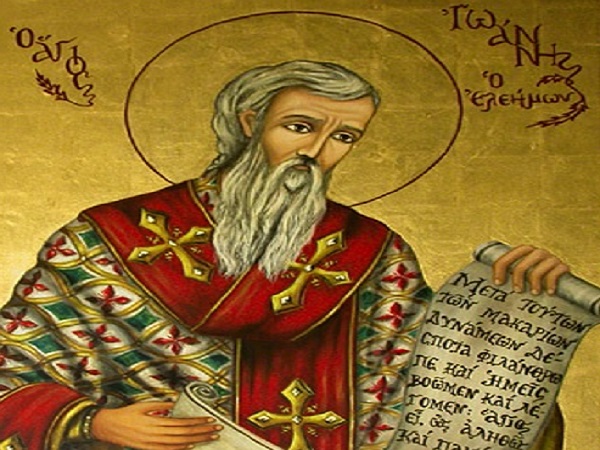The two poles of the spiritual life (Memory of Saint John the Charitable)
12 November 2019Today our Church celebrates the memory of Saint John the Charitable [Merciful], Patriarch of Alexandria. Saint John came from Cyprus, and was the son of rich and devout parents. Even though he was brought up in comfort, he concentrated his mind and attention on his devotions. Seeing that his pure soul would produce great spiritual fruit in the future, Divine Grace destined him for and exalted him to the throne of Alexandria, which was at its height at the time. In his Life, mention is made of a symbol which Grace sent as an indication of his future way of life. In a dream, he saw a beautiful maiden crowned with an olive wreath, who said to him: ‘I’m the first daughter of the King. If you love me, I have the power to bring you to Him’. Saint John concluded that this was the Grace of empathy and charity.
And this is so. The central point of the greatness that is befitting to God is empathy. It was this which, in a sense, moved God to create the world out of nothing. But even when the world bankrupted itself through its own carelessness and lost its equilibrium, the Divine Word ‘emptied’ Himself, again out of empathy and compassion. He moved into this world, clothed Himself in our own poverty and brought creation, which was out of kilter, back into balance. Charity is the only-begotten daughter of God. It was she, according to the saint’s Life, who called the young man and told him: ‘If you love me, I’ll take you to the king, because I have great influence with him’.

When he was consecrated Patriarch of Alexandria, the city and the whole area under his jurisdiction was undergoing many trials, because this was the time when Islam was beginning its expansion. Raids had begun in those areas and there was pressure on the Christian world. Added to these were various natural disasters, such as drought, which caused poverty, hunger and misery. The region was in a sorry state, because the River Nile hadn’t flooded due to the lack of rain in the areas where it rose. As a result of these disasters, Christians sought refuge, charity, food and support in the city of Alexandria. Then it was that Saint Ioannis, who was the right person in the right place and time, revealed the true nature of his soul. He showed the real empathy which he felt. At that time the Church was financially independent. It had its own funds and had no need of state support. In difficult times it was even able to govern. It built hospitals, nursing homes and educational establishments and gave practical help to people. At this time, the saint showed his inimitable charity, which is why he earned the epithet ‘Charitable’. Anyone can read his Life, but what we want to stress and what’s of benefit to us is the manner in which he empathized with others, because this is one pole of our destined course.
There are two poles between which we act as perfect and reasonable beings. One is to love God ‘with all our soul, with all our might and with all our heart’ The other is to love our ‘neighbour as our self’. If we achieve the former, we’ll certainly achieve the latter.
How should we set about loving ‘the Lord our God’?
If we’re to love and worship God, we have to rightly believe in Him. In order to do so, we have to know Him. This means, in the first place, inductive knowledge. Inductive knowledge engenders inductive faith. Provided inductive knowledge isn’t corrupted by outside influences, it automatically gives birth to inductive faith. Because faith is a reality within the soul. It’s not a construct, as various materialists would like to deceive us into believing today. Faith’s a real entity in the spiritual world. It’s part and parcel of the spirituality of rational beings.
When the intellect is sound, people cannot help but believe and accept that it is not possible for this harmony to exist in the universe unless there’s some force, some authority which has arranged everything and provides for it. According to the laws of physics, nothing comes into being simply by itself. Despite all the research and despite the stubbornness of those without faith, this law still stands.
Through inductive faith, people begin to believe that God really exists. The matter of real faith is resolved through revelation.. Today we have no need to fumble about in order to reveal God. Through the ‘self-emptying’ of the Word of God, with the presence of one Person of the Blessed Trinity, we enter into that faith which the Church transmits to us, the centre of Revelation. Because what we’re interested in is not learning whether God exists, but rather in sorting out our relations with Him.
As people living after the Fall, we can’t exist without the presence of God. Subject as we now are to death, corruption, transience, pain and devastation, we have to be liberated from all that, but there’s no force that can do this except God. Without the mysterious presence of His providence, nothing can exist, neither we ourselves nor any element. We need our personal salvation because the spectre of death hangs over us.. There’s no escaping this. Through death’s mill we’re brought to destruction and perdition. But we must get round it. In order to do so we have to have a relationship with Him Who is the absolute Principle of Life. Only the source of life can abolish death and forcibly liberate those who flee to Him. Then our faith’s transformed from inductive to contemplative; to real faith, which means submission to God’s will. We’re prepared to offer whatever it is that God wants. It’s this submission to the will of God that’s involved in the commandment: ‘Love the Lord your God with all your soul, all your heart and all your mind’.

By our submission to God, we apply our love practically. Submission is the tool of love. Abstract love can’t exist. Love is specific. How can you demonstrate practical love unless you act to serve those who you say you love? Since you claim to love God, then, you’ll implement what He asks of you with all your soul. Not just for the sake of appearance, but out of real intent. By showing that we love God entirely and that we put Him and His will first, before our own life, we convince Him, and He comes and unites Himself with us. There is a true union between Him and us humans, what we call ‘Theanthropism’, which the Word of God taught us in practice through His own presence. And when we give to God what we have of our love, then He gives to us His own love, His own promises. We apply what Jesus told us: ‘Those who love me have my commandments and observe them’. And ‘Those who love me will be loved by my Father and my Father and I will come and make a dwelling place for them with Him’. When we reach this position, we partake in the divine attributes. This is like what happens to iron when we put it in a fire. It, too, becomes fire. It goes red and takes on all the attributes of fire, without changing. It remains iron, but burns and illumines, just as fire does. The same is true of people who’ve taken on divine attributes. They become wholly love and then they ‘love their neighbour as themselves’. They don’t live for themselves. This is exactly what Saint Paul says: ‘Let each of us please our neighbours to their good, for edification’. And Saint John is even bolder: “We ought to lay down our souls for our brethren’.
This was the position attained by our Fathers, and having managed to love God in their isolation, with all their soul, with all their heart and with all their mind, and having received the divine energies, they then turned to us who are sick and feeble, passing on to us all the understanding and love which God gave them. Saint John the Charitable is one of the many whom our Church has enriched. By his intercessions, I pray that we make a start with good intentions, loving first God and then our neighbour. Amen.






